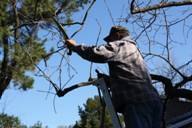Trimming the Yuzu Tree: Reflection #4
 After watching Dominic trim the Yuzu tree in my cousin’s yard, I heard him express his concern that the tree will likely not bare much fruit because the area in which it was planted does not provide enough light. As Dominic explained, “It is not where you want it to be. It’s where it wants to be.” Dominic’s words provide comfort to those of us who have compassion for our students and feel a sense of frustration as we watch their personal lives overshadow their potential academic achievement.
After watching Dominic trim the Yuzu tree in my cousin’s yard, I heard him express his concern that the tree will likely not bare much fruit because the area in which it was planted does not provide enough light. As Dominic explained, “It is not where you want it to be. It’s where it wants to be.” Dominic’s words provide comfort to those of us who have compassion for our students and feel a sense of frustration as we watch their personal lives overshadow their potential academic achievement.
Our students have complicated lives. Too often, demands of family or work or other personal concerns overshadow their educational goals. While we want them in class, these outside influences encourage them to be elsewhere; often for very good reasons.
I, too, have a complicated life and while my skills at juggling various responsibilities is more developed than my students, the personal sometimes interferes with my educational responsibilities. For example, there was the time I cut my finger and had to schedule a doctor’s appointment during class time. While I would have preferred he check the stitches at a time when I was not teaching, I knew he would not be willing to adjust his office schedule to accommodate my desires. My students were very understanding of my situation because they, too, have experienced the necessity of making hard choices between personal and academic commitments.
One day a few years ago, instead of coming to campus, I accompanied my father to the hospital when he had a medical procedure. There have also been times when I stayed home from campus when I was ill. Although my students do not have sick days or personal business days built into the syllabus as I have such days built into my contract, their illnesses and other personal business is no less legitimate than mine. As a result, I do my best to work with students who have to miss class.
Yet, there are limits. I once had a dedicated student who had many legitimate personal reasons for missing class. As a result of her absences, she kept falling further and further behind. Unfortunately, it reached the point where it was no longer possible for me to effectively work with her in such a way that she could pass the course. While I wanted her to be in the classroom, she wanted to be elsewhere. In fact, she needed to be elsewhere.
I have heard colleagues callously take the position that such a student deserves to fail. Yet, it is possible to recognize that the student cannot pass the course through no fault of her own. We would not blame my cousin’s Yuzu tree for its failure to produce more fruit. Instead, we would recognize that external factors contributing to its lack of success. If we can be charitable to the Yuzu tree, we should be able to honor her decision to attend to personal matters without blaming her for her failure.
Several years ago, legitimate personal issues caused a colleague to drop his classes mid semester. Even though he could not fulfill his responsibilities by remaining in the classroom, we did not condemn him for being irresponsible. While we would have preferred that he continue to teach, we recognized that it was not about where we wanted him to be; that it was about where he needed to be.
In the case of my student, I had to make the hard decision that there was nothing further I could do to assist her in passing the class. She needed to be elsewhere and I understood and supported her decision. But it did not end there. I intervened on my student’s behalf and provided her with information about how she could get a medical withdrawal which would allow her to repeat the course without having to pay for it again. I also made phone calls and sent e-mails to appropriate individuals on this student’s behalf so that she could get additional support.
While some students fail because of irresponsibility, responsible students can become overwhelmed by their personal lives. Whenever possible, I do my best to work with responsible students so that they can successfully complete their coursework—even if they must complete the work after the semester ends. When such a response is not possible, I make appropriate referrals to colleagues who are trained to provide the necessary assistance.
- –Steven L. Berg, PhD
Photo Caption: Dominic
LEAVE A COMMENT